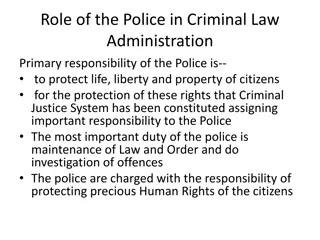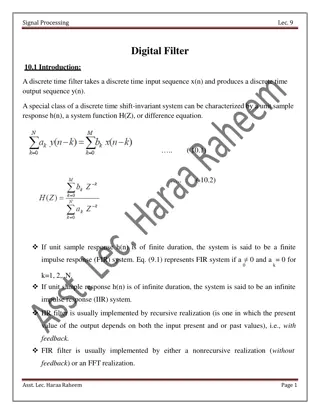Understanding the First Information Report (FIR)
An FIR, or First Information Report, is a crucial document that initiates criminal investigations by the police. It must pertain to a cognizable offense and is the first step in the criminal justice process. Anyone aware of such an offense, including police officers, can file an FIR. The report should include essential details like names, dates, and witnesses, and must be accurate and concise. Knowing how to lodge an FIR and its key components can help ensure efficient law enforcement procedures.
Download Presentation

Please find below an Image/Link to download the presentation.
The content on the website is provided AS IS for your information and personal use only. It may not be sold, licensed, or shared on other websites without obtaining consent from the author. Download presentation by click this link. If you encounter any issues during the download, it is possible that the publisher has removed the file from their server.
E N D
Presentation Transcript
FIR (First Information Report) Vishal Vikram Singh
What is an FIR? It is an information which is given to the police officer; Information must relate to a cognizable* offence; It is an information first in point of time; It is on the basis of this information that investigation into the offence commences. * Section 2(c) Cr.P.C., cognizable offence means an offence for which, and cognizable case means a case in which police officer may, in accordance with the First Schedule or under any other law for the time being in force, arrest without warrant.
Objects and importance of FIR. It sets the process of criminal justice in motion. Police start investigation of the case. To obtain early information regarding the circumstances I which the crime was committed. Where the FIR is also a dying declaration, it can be used as a substantive or primary evidence as a dying declaration.
Who can lodge FIR? Anyone who knows about the commission of a cognizable offence can file FIR. It is not necessary that only the victims of the crime should file an FIR. A police officer who comes to know about a cognizable offence can file FIR himself/herself.
What should be mention in FIR? Your name and address; Date, time and location of the incident you are reporting; The true facts of the incident as they occurred; Names and descriptions of the persons involved in the incident; Witnesses, if any; Never give wrong information to the police; Never exaggerate or distort facts; Never make vague or unclear statements.
What is the procedure of filing FIR? The procedure for filing FIR is given under section 154 of Cr.P.C. When information about the commission of a cognizable offence is given orally, the police must write it down and provide the photocopy of the same free of cost to the person giving information. When information is given in writing then also above procedure will be followed. The person giving information will signed on appropriate place. People who cannot read or write must put their left thumb impression on the document after being satisfied that it is a correct record. Any person aggrieved by a refusal of writing of FIR by officer-in-charge of police station may send the substance of such information in writing and by post, to the Superintendent of Police(SP) concerned. If he satisfied that such information discloses the commission of a cognizable offence, shall either investigate the case himself or direct an investigation to be made by an police officer subordinate to him.
What is an effect of Delay in filing FIR? Delay in giving first information can be condoned satisfactory explanation. Where the delay is so long as to throw a cloud of suspicion on the deeds of prosecution then FIR can be questionable. if there is
Cases on delay in filing of FIR HARBANS KAUR VS. STATE OF HARYANA 2005 SC 2199. in this case it was held that even a long delay in lodging FIR in murder can be condoned if witnesses have no motive of implicating accused. HARPAL SINGH AND OTHER VS. STATE OF H.P. 1981 SC 1.- In this case it was held that in the case of rape the delay in lodging FIR can be allowed because it involve the honour of the family.
Cases on FIR LALITA KUMARI VS. STATE OF UP 2008 SC 68.- in this case it was held that registration of FIR is mandatory under section 154 Cr.P.C. if the information discloses commission of cognizable offence and no preliminary inquiry is permissible in such a situation. C. KUMARAVEL VS. THE DIRECTOR OF POLICE AND OTHERS. KISHAN CHAND VS. STATE OF RAJASTHAN.
ZERO FIR A document that can be registered by any police station for a cognizable offence, without bothering about whether the case is in their jurisdiction or not.























